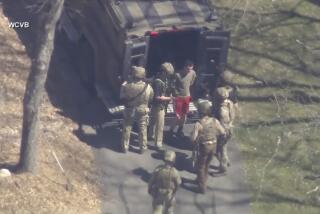Pentagon Pushes for Covert Aid to Oust Iraq’s Hussein : Mideast: Defense officials lament ‘paralysis’ in U.S. policy. The White House and State Department so far resist the call.
- Share via
WASHINGTON — Complaining of “paralysis” in Bush Administration policy toward Iraq, senior Pentagon officials are pushing for covert military and political aid to Iraqi dissidents in a more aggressive effort to topple President Saddam Hussein, Defense Department sources say.
So far, their calls have been rejected by the White House and the State Department, whose officials are distrustful of Iraqi opposition leaders and appear to prefer a stable Iraq with Hussein in power to the risks of a U.S.-sponsored insurgency.
“There is frustration here that State and the NSC (National Security Council) are losing the war that we won,” a senior Pentagon analyst said. “There’s just inertia and a failure to come up with a more aggressive stance for getting rid of (Hussein).”
Defense officials complain that the State Department has had virtually no contact with leaders of Iraqi dissident groups, either the Kurdish rebels in the north or Shiite Muslim foes of the Baghdad regime in the south.
After the cease-fire in the Persian Gulf War in late February, both groups rose up to try to overthrow Hussein and his ruling Arab Baath Socialist Party. The rebellions were cruelly crushed by Hussein’s remaining forces, driving hundreds of thousands of Kurdish refugees into mountain sanctuaries and leaving thousands more Shiites homeless in the south.
“I have a real problem with the ‘professionals’ at State,” a senior Pentagon policy-maker said. “They believe all Shiites are aligned with Iran and, therefore, bad, and we shouldn’t deal with any of them. And they don’t trust any of the Kurdish leaders. We feel we’ve done our job, and State has failed to follow up.”
Sentiment for a more ambitious clandestine aid program for the Iraqi opposition is increasing on Capitol Hill as well, congressional sources said.
A number of influential lawmakers on the Foreign Affairs and Intelligence committees are pressing the Administration to provide military, intelligence and logistic support for Kurdish and Shiite rebels. Such an operation could be patterned after the covert aid program for Afghan rebels fighting Soviet forces in the 1980s but on a smaller scale, congressional officials said.
“We could provide ammunition, training, communications, intelligence--all would enhance their ability to defend the large territory they occupy,” one well-placed Senate staff member said. “But there is no policy, except the status quo. There is growing sentiment up here that we have to move more aggressively to get rid of Saddam and enhance the ability of the Kurds to defend themselves.”
A White House spokesman declined to comment on the complaints from Congress and the Pentagon.
Meanwhile, Hussein is taking advantage of apparent Western indifference or inattention to isolate guerrilla-controlled Kurdish areas in northern Iraq and to cut supplies of food, fuel and building materials as winter approaches, officials said.
Kurdish spokesmen and U.S. officials said that the clampdown appears to be part of an effort by Baghdad to demonstrate the vulnerability of Kurdish populations and to deter any anti-government activities. Kurdish opposition groups also said that Hussein’s forces have initiated a new round of helicopter gunship attacks on Kurdish towns and villages.
Spokesmen for Kurdish independence groups said that the blockade and the attacks are part of a concerted effort to pressure Kurds into signing an accord with Baghdad that would grant them limited autonomy in exchange for pledges to end their attacks on Hussein’s military forces and civilian authorities.
“What he is doing in Kurdistan is a blatant violation of cease-fire resolutions,” said Barham Salih, Washington representative of the Iraqi Kurdistan Front. “He is bombarding Kurdish towns and cities. There are large numbers of refugees. We are waiting for another catastrophe to take place.”
Salih and others in the Kurdish independence movement are critical of the Bush Administration for failing to move more resolutely against Hussein.
A State Department spokeswoman, asked to respond to the critical comments from the Pentagon and Iraqi opposition figures, said the Administration is “deeply concerned about the human rights of Kurds and other civilians living under the brutal leadership of Saddam Hussein.” She also said that the department has not ignored Kurdish and Shiite leaders.
More to Read
Sign up for Essential California
The most important California stories and recommendations in your inbox every morning.
You may occasionally receive promotional content from the Los Angeles Times.













